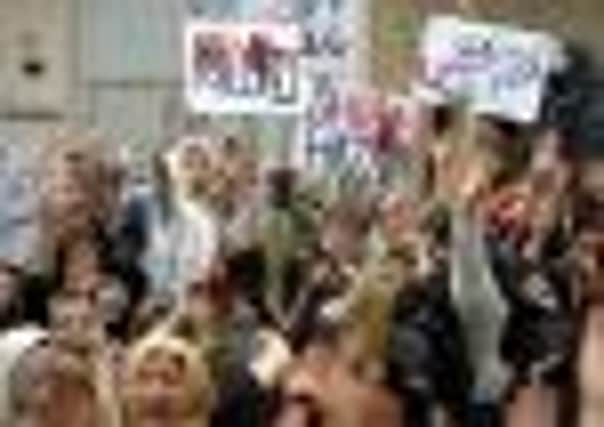Pakistan: Dead left unburied in bombing protest


There were continued protests against the lack of protection many believe they are afforded, with more than 15,000 turning out in Quetta, where Saturday’s bombing took place.
But the attacks continued yesterday, with militants wearing suicide vests and disguised as policemen attacking the office of a senior political official in northwest Pakistan, killing six people.
Advertisement
Hide AdAdvertisement
Hide AdPakistan has been besieged by militant attacks in recent years, many of them carried out by the Pakistani Taleban, who have been waging a bloody insurgency against the government. Radical Sunni militant groups have also increasingly targeted the country’s Shiites because they do not view them as real Muslims.
Many of these sectarian attacks have occurred in southwest Baluchistan province, which has the largest concentration of Shiites in Pakistan. Many are Hazaras, an ethnic group that migrated from Afghanistan more than a century ago.
The bomb that ripped through a produce market on Saturday in Baluchistan’s provincial capital of Quetta was the second mass-casualty attack targeting Shiites in the city in a little over a month. A double bombing at a snooker hall in January killed 86 people.
“We will not bury our martyrs until our demands are fulfilled,” a Shiite leader, Amin Shaheedi, said yesterday at a protest in Quetta.
Police estimated that the crowd of protesters numbered at least 15,000. Some poured into the streets near the attack site carrying signs and chanting slogans against terrorism. Others remained inside a mosque beside the bodies of their relatives. One young girl wrote on her face: “Don’t kill me. I am Shia.”
The death toll from the most recent blast, caused by a bomb hidden in a water tank, rose to 89 yesterday after eight people died of their wounds, said Baluchistan’s home secretary, Akbar Hussain Durrani.
Outrage over the attacks has grown in Pakistan, and protests were held in more than half-a-dozen cities yesterday.
After the bombing in January that killed 86 people, Shiites camped out in the streets for four days alongside the coffins of their loved ones. Eventually the country’s prime minister ordered a shake-up in the regional administration, putting the local governor in charge of the whole province. But the governor has expressed frustration, saying the recent bombing was the result of a failure of the provincial security and intelligence services.
Advertisement
Hide AdAdvertisement
Hide AdThe most significant protests outside Quetta yesterday occurred in Pakistan’s largest city, Karachi, on the south coast. Hundreds of protesting Shiites paralysed key areas of the city by blocking major roads, including the one that leads to the airport.
Violence in Karachi risked exacerbating sectarian tensions. Gunmen opened fire on a restaurant in the city, killing two people, said a police spokesman.
A spokesman for Sunni extremist group Ahle Sunnat Waljamaat said two of its activists were killed in the attack. Members of the group clashed with police after the shooting, he said.
In the eastern city of Lahore, gunmen on a motorcycle shot dead a Shiite doctor and his 12-year-old son, but it was unclear whether the attack was sectarian in nature, police said.
The target of yesterday’s attack in the north-western city of Peshawar was the office of the top political official for the Khyber tribal area, a major militant sanctuary in the country.
At least five militants, wearing the same type of uniform as the tribal police who protect the compound, attacked the guards with assault rifles and hand grenades, said Mian Iftikhar Hussain, information minister for surrounding Khyber Pakhtunkhwa province.
Some managed to slip inside the compound, and two blew themselves up. Officials are trying to determine what happened to the other attackers, the minister said.